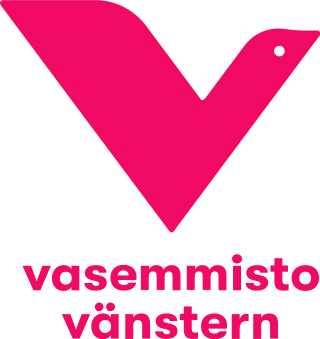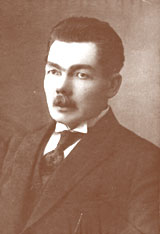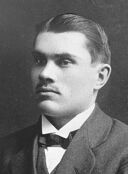Related Research Articles

The politics of Finland take place within the framework of a parliamentary representative democracy. Finland is a republic whose head of state is President Alexander Stubb, who leads the nation's foreign policy and is the supreme commander of the Finnish Defence Forces. Finland's head of government is Prime Minister Petteri Orpo, who leads the nation's executive branch, called the Finnish Government. Legislative power is vested in the Parliament of Finland, and the Government has limited rights to amend or extend legislation. The Constitution of Finland vests power to both the President and Government: the President has veto power over parliamentary decisions, although this power can be overruled by a majority vote in the Parliament.
The Swedish People's Party of Finland is a Finnish political party founded in 1906. Its primary aim is to represent the interests of the minority Swedish-speaking population of Finland. The party is currently a participant in the Government of Petteri Orpo, holding the posts of Minister of Education, Minister for European Affairs, and Minister of Youth, Sport and Physical Activity.

The Left Alliance is a socialist political party in Finland.

The Finns Party, formerly known as the True Finns, is a right-wing populist political party in Finland. It was founded in 1995 following the dissolution of the Finnish Rural Party.

Forssa is a town and municipality of Finland. It is located almost in the centre of a triangle defined by the three largest major cities in Finland, in the Tavastia Proper region, and which is crossed by Highway 2 between Pori and Helsinki and Highway 10 between Turku and Hämeenlinna. The town has a population of 16,475 and covers an area of 253.38 square kilometres (97.83 sq mi) of which 4.61 km2 (1.78 sq mi) is water. The population density is 66.21 inhabitants per square kilometre (171.5/sq mi). Only a little part of the surface area of Forssa is water, but the river Loimijoki forms an important element in the cityscape, with the city being located at its starting point. Other notable water areas in Forssa include the lake Kaukjärvi and the lake Koijärvi, known as the birthplace of the Green League.

Kanta-Häme, sometimes referred to by the obsolete Tavastia Proper or as the Häme region, is a region of Finland. It borders the regions of Southwest Finland, Pirkanmaa, Päijät-Häme, and Uusimaa.

Forssan Palloseura is a Finnish ice hockey team based in the town of Forssa. As of the 2024–25 season, FPS plays in the Finnish third tier, Suomi-sarja. FPS play their home games in the Forssa Ice Hall that has a capacity of 3,000. Forssan Palloseura played two seasons in the Finnish Elite League from 1975 to 1977.

Loimaa is a town and municipality of Finland.

Yrjö Esalas Emanuel Mäkelin, was a Finnish Socialist, journalist, a leader of the Finnish labour movement and Member of Parliament 1908–1910, 1913–1918.

The Nordic model comprises the economic and social policies as well as typical cultural practices common in the Nordic countries. This includes a comprehensive welfare state and multi-level collective bargaining based on the economic foundations of social corporatism, and a commitment to private ownership within a market-based mixed economy – with Norway being a partial exception due to a large number of state-owned enterprises and state ownership in publicly listed firms.

Presidential elections were held in Finland in January and February 2012. The first round took place on 22 January 2012 with advance voting between 11 and 17 January. Since no candidate received a majority of the vote, a second round was held on 5 February, with advance voting between 25 and 31 January. Sauli Niinistö was elected the President of Finland for a term from 1 March 2012 until 1 March 2018.

The Social Democratic Party of Finland is a social democratic political party in Finland. It is the third largest party in the Parliament of Finland with a total of 43 seats.
Irreligion in Finland: according to Statistics Finland in 2020, 29.4% of the population in Finland were non-religious, or about 1,628,000 people. The Union of Freethinkers of Finland and other organisations have acted as interest organisations, legal protection organisations and cultural organisations for non-religious people. In a 2018 international ISSP survey, 40% of the Finnish population said they did not believe in God, 34% said they believed in God and 26% did not know. Nearly one out of every five people in the country is not a member of a religious organisation, and the number of people with no religious affiliation has doubled in two decades.
Naisten Korisliiga is the highest tier of women's basketball in Finland. The competition was formerly known as Koripallon naisten SM-sarja and was renamed Naisten Korisliiga for the 2013-14 season.

Toivo Villiam Alavirta was a Finnish journalist and politician. He was a member of the Parliament of Finland from 1916 to 1918. He died in prison after being convicted of political crimes during the Great Purge.

Forssan Ice Hall is an indoor ice hockey sports venue in Forssa, Finland.
The Patriotic People's Party was a Finnish Nazi party in the early 1930s, led by mason Ernest Hedborg.

The Blue-and-Black Movement is a neo-fascist de-registered political party in Finland.

Koijärvi is a former municipality of Finland in the former Häme Province, now in Tavastia Proper. It was split between Forssa and Urjala in 1969, most of the land was given to Forssa.
Socialism in Finland is thought to stretch back to the latter half of the 19th century in the Grand Duchy of Finland, with the radicalization of the labour movement and increasing industrialization of Finland.
References
- ↑ Vuosisatamme kronikka. Gummerus. 1987. p. 49. ISBN 951-20-2893-X.
- ↑ "Forssan ohjelma". sdp.fi. Social Democratic Party of Finland. Retrieved 12 August 2017.